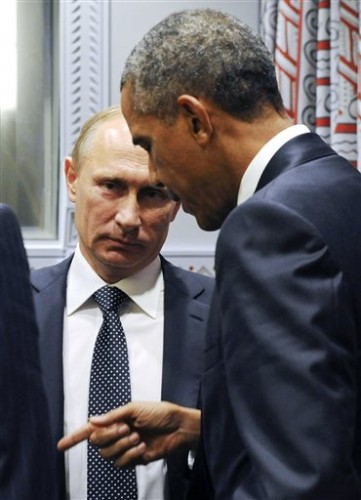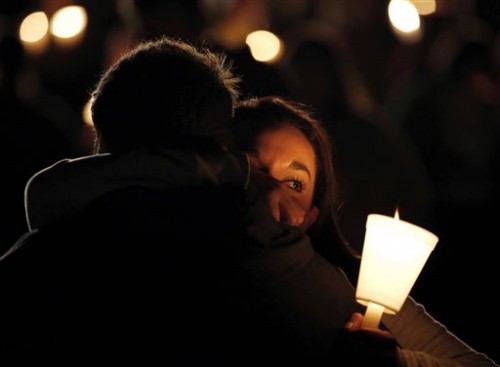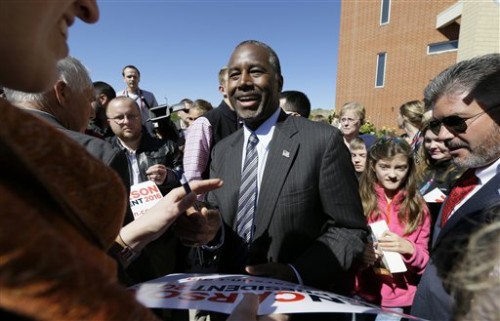This week, Russia intervened in the war in Syria, Republican candidate Ben Carson continued his controversial rhetoric on Muslims and 10 were killed in an Oregon college shooting.

Russia enters Syrian war
More than 1,500 days ago, the Obama administration first declared that Syrian President Bashar al-Assad’s “days are numbered.”
He’s still there, though, and a convergence of Western trepidation and Russian resolve could strengthen his position further. But it also could set the stage for a long-sought political transition leading to the end of the Assad family’s 45-year rule.
In either case, Assad’s Russian and Iranian backers could arguably claim victory.
But there’s also a painful third possibility. Russia’s decision to intervene with airstrikes this week could just prolong and exacerbate an already brutal conflict that has spawned the largest refugee crisis since World War II and helped the rise of the radical Islamic State group that, Russian Foreign Minister Sergey Lavrov says, aims to establish a caliphate from “Portugal to Pakistan.”
Administration officials have alternately welcomed a Russian role, provided it is limited to fighting the Islamic State and al-Qaida affiliates, and denounced it as a tool to rescue Assad or a cynical attempt to boost Moscow’s own military presence in the Mediterranean. U.S. officials acknowledge they really don’t know what Russia’s intentions are. But what is clear is that the Russians have inserted themselves into a conflict the U.S. would have preferred they stay out of.
After accusing Russia of direct military intervention in the Ukraine crisis, something Moscow adamantly denies, the administration is confronted with an overt show of Russian force in the Middle East, a region where Washington has traditionally seen itself as the main outside power.
A meeting between Presidents Barack Obama and Vladimir Putin and three meetings between Lavrov and Secretary of State John Kerry at the U.N. General Assembly in New York had yielded only the beginning of military-to-military talks to avoid having each other’s fighter jets bump into each other, and an as-yet undetermined new effort to promote a political transition.

10 killed, nine injured in Oregon shooting
The news from Oregon was grim enough in isolation — nine people shot dead at a community college. For many Americans it was all the sadder as a reminder of how frequent, how depressingly routine, mass shootings have become — in malls, at churches, and so often at schools and colleges.
In Loveland, Colorado, an elementary school principal mused wistfully on how security precautions now preoccupied her staff, including adults-only evacuation drills that exempt the students in order not to traumatize them. “It’s a sad indicator of our world right now that we have to have a plan,” said Michelle Malvey.
In Washington, U.S. Rep. Tim Murphy of Pennsylvania said he went into his office and wept on hearing of the Oregon tragedy, thinking, “Here we go again.”
A school security expert in Texas advised Americans to brace for recurrences. “This is the equivalent of: We know the tsunami is coming and we’re trying to get to higher ground,” said Greg Crane, a former police officer.
Details remained scant about why a 26-year-old walked into a classroom Thursday at Umpqua Community College and opened fire. But enough was known to trigger outrage and profound frustration that a new place name — Roseburg, Oregon — had been added to a list that includes Newtown, Columbine, Charleston and many more scarred communities.
“We are the only advanced country on earth that sees these kinds of mass shootings every few months,” a visibly frustrated President Barack Obama said in a televised address hours after the Oregon rampage.
“Somehow this has become routine. The reporting is routine, my response here at this podium ends up being routine, the conversation in the aftermath of it. We’ve become numb to this.”
James Tucker, 70, the co-owner of an antique store in Sycamore, Illinois, about 70 miles west of Chicago, said Obama’s comments underscored his pessimistic view that what happened in Oregon will happen again and again.
“You thought Sandy Hook would be a watershed at the time, but it turns out it wasn’t,” he said. “Nothing changed.”
Except, he said, some things have changed.
“You do start to worry about things that might be a target,” he said. “We go to the Lyric Opera in Chicago and I walk in there and I think, ‘What if somebody tried to make a statement?’ What better place? It’s a fleeting thought, but you do think about it now.”
The reality is that mass shootings in the U.S. are rare and deaths in such attacks account for a tiny fraction of the more than 31,000 people killed by gun shots annually, said Grant Duwe, a criminologist with the Minnesota Department of Corrections.
All mass murders — in which four or more people are killed — are 0.2 percent of all U.S. homicides, Duwe said. That figure includes episodes of extreme violence within families or during the commission of robberies or other crimes.
Still, the rate of mass shootings at schools, churches and other settings where the victims appear to be random targets has increased by 26 percent in the last decade, said Duwe, author of “Mass Murder in the United States: A History.”
“What’s different since the mid-2000s is the regularity with which these cases have occurred, that there really hasn’t been any letup,” Duwe said. “These are usually incidents where people didn’t know the shooter, essentially they are innocent victims, and I think a lot of people feel like this could’ve been me, could’ve been my child, my spouse, my parents.”
Steven Goncalves, a bread franchise owner from Cumberland, R.I., shares Duwes worries.
“I can honestly tell you that I’m not shell-shocked by any of these anymore,” he said. “Me and my wife will discuss it at times and say, ‘What’s going to be the next place? We’ve had schools, we’ve had the movie theaters, we’ve had the churches, where’s the next place?’“

Carson continues anti-Muslim, refugee rhetoric
Republican presidential candidate Ben Carson said the U.S. should bar refugees from war-torn Syria because they are “infiltrated” with Muslim extremists who seek to harm America.
The comments come as Carson has taken an increasingly aggressive stance toward Muslims, and after rival Donald Trump pledged he would support deporting Syrian Muslims from the U.S.
“To bring into this country groups infiltrated with jihadists makes no sense,” Carson told about 150 people at the Des Moines Rotary Club. “Why would you do something like that?”
Instead, Carson recommended that the U.S. help settle Syrian refugees in the Middle East, in places such as Turkey. In Carson’s view, the U.S. could assist financially but not open its doors.
Carson later told reporters that, despite the German official’s comments, terrorists “would be fools not to” try to enter the United States with Syrian refugees.
“At some point you have to use common sense and judgment,” Carson said. “If you are part of the global jihadist movement, and you see large numbers of people from your area moving into the United States, wouldn’t you want to infiltrate them?”
Carson’s comments echo Trump, who said Wednesday: “If I win, they’re going back,” referring to Muslim Syrian refugees.
Carson has also launched a petition challenging the tax exempt status of the largest Muslim advocacy group, part of an escalating rift with the U.S. Muslim community.
The Council on American-Islamic Relations last month called for Carson to quit the presidential race after he said a Muslim should not serve as president. He has since clarified his position, stating he wouldn’t support a radical Muslim who did not support the Constitution.

